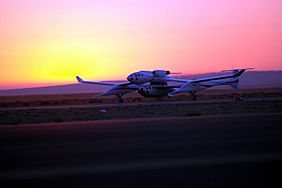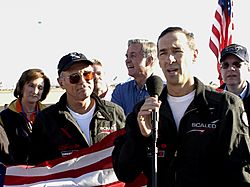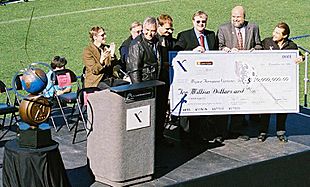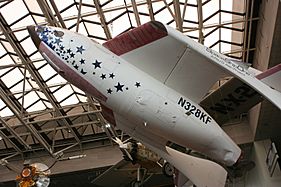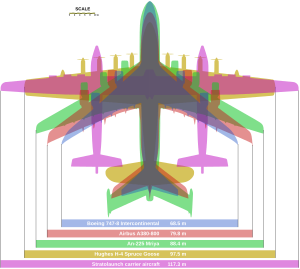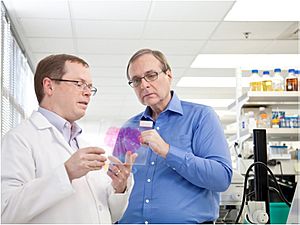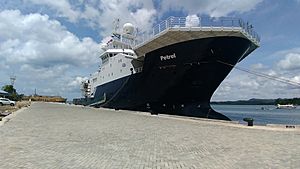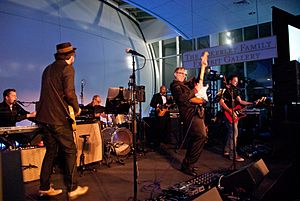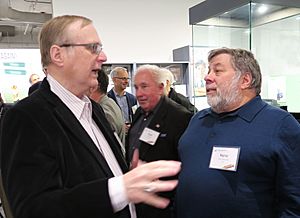Paul Allen facts for kids
Quick facts for kids
Paul Allen
|
|
|---|---|
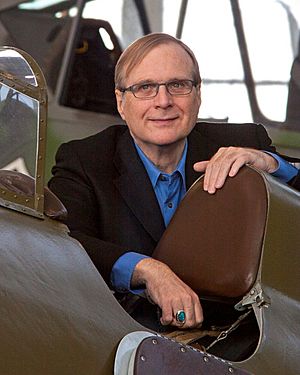
Allen at the Flying Heritage Collection in 2013
|
|
| Born | January 21, 1953 Seattle, Washington, U.S.
|
| Died | October 15, 2018 (aged 65) Seattle, Washington, U.S.
|
| Education | Washington State University (attended) |
| Occupation |
|
| Years active | 1972–2018 |
| Known for | Co-founding of Microsoft |
| Title |
Partial list of founded and owned companies
Chairman and co-founder of Vulcan Inc.
Owner of Seattle Seahawks and Portland Trail Blazers Part-owner of Seattle Sounders FC Founder of Allen Institute for Brain Science Founder of Allen Institute for Cell Science Founder of Allen Institute for Artificial Intelligence Founder of Apex Learning Founder of Stratolaunch Systems Co-founder of Mojave Aerospace Ventures Strategy advisor at Microsoft |
| Relatives | Jody Allen (sister) |
Paul Gardner Allen (January 21, 1953 – October 15, 2018) was an American businessman, computer programmer, and generous giver (philanthropist). He is best known for starting Microsoft Corporation with his friend Bill Gates in 1975. This company helped kick off the personal computer revolution in the 1970s and 1980s. Microsoft grew to become the world's largest company for computer software. At the time of his death, Paul Allen was one of the richest people in the world, with billions of dollars.
In 1983, Paul Allen stepped away from daily work at Microsoft due to an illness. He and his sister, Jody Allen, started Vulcan Inc. in 1986. This company managed his many business projects and his charity work. He invested in many areas, including technology, media, scientific research, and even private space travel. He owned the Seattle Seahawks football team and the Portland Trail Blazers basketball team. He was also a part-owner of the Seattle Sounders FC soccer team.
Paul Allen founded important research centers like the Allen Institute for Brain Science, Allen Institute for Artificial Intelligence, and Allen Institute for Cell Science. He also started companies such as Stratolaunch Systems and Apex Learning. He gave away more than $2 billion to help with education, protect wildlife and the environment, support the arts, and improve healthcare. In 2004, he helped fund SpaceShipOne, the first private spaceplane to carry people. He received many awards and was named one of the Time 100 Most Influential People in the World in 2007 and 2008.
Paul Allen passed away on October 15, 2018, at age 65, due to complications from cancer.
Contents
Early Life and Computer Fun
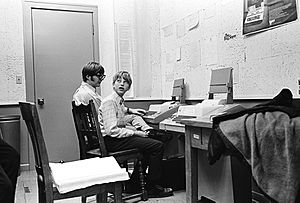
Paul Allen was born in Seattle, Washington, on January 21, 1953. His father was a librarian, and his mother was a teacher. From 1965 to 1971, he went to Lakeside School, a private school in Seattle. There, he became good friends with Bill Gates. They both loved computers very much.
They used the school's computer terminals to practice their programming skills. They also used computers at the University of Washington for their own research. Paul and Bill, along with friends, formed the Lakeside Programming Club. They looked for mistakes in computer programs in exchange for more computer time.
In 1972, after a friend passed away, Bill Gates asked Paul Allen to help finish a system for scheduling classes at Lakeside. Then, they created a company called Traf-O-Data. This company made traffic counters using an early computer chip. Paul Allen remembered that he and Bill Gates would sometimes look for old computer program code during their teenage years.
Paul Allen got a perfect score on his SAT test. He went to Washington State University but left after two years. He decided to work as a programmer for Honeywell in Boston. Bill Gates was studying at Harvard University nearby. Paul Allen convinced Bill Gates to leave Harvard so they could start their own company: Microsoft.
Starting Microsoft
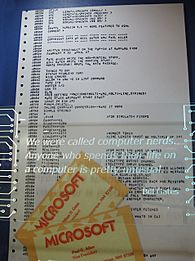
Paul Allen and Bill Gates officially started Microsoft in 1975 in Albuquerque, New Mexico. They began selling a programming language called BASIC. Paul Allen came up with the name "Micro-Soft," combining "microcomputer" and "software."
In 1980, Microsoft promised to deliver a special operating system (DOS) to IBM for their first IBM PC. Even though they didn't have one yet, Paul Allen quickly made a deal. Microsoft bought a system called QDOS (Quick and Dirty Operating System). This deal helped Microsoft get a contract to provide the operating system for IBM's PCs. This was a huge step that led to Paul Allen's and Bill Gates' great success.
Paul Allen left Microsoft in 1982 after being diagnosed with an illness. He stayed on the board of directors as a vice chairman. He and Bill Gates had some disagreements about their shares in the company. Paul Allen decided to leave the company but kept his shares. This made him a billionaire when Microsoft became a public company. Later, Paul and Bill became good friends again. They even donated money to their old school, Lakeside.
Paul Allen officially left the Microsoft board in 2000. However, he continued to advise the company's leaders. In 2014, he still owned many shares of Microsoft.
Businesses and Investments
Paul Allen's company, Vulcan Inc., managed his many business and investment projects.
Technology and Finance
- Vulcan Capital: This part of Vulcan Inc. managed Paul Allen's personal wealth. In 2013, he opened a new office to invest in new technology and internet companies.
- Patents: Paul Allen held 43 patents for his inventions.
- Apps: He supported several mobile app startups, including Saga, SportStream, and Fayve.
- Interval Research Corporation: In 1992, Paul Allen started this lab to create new businesses. It developed over 300 patents.
- Ticketmaster: In 1993, Paul Allen invested a lot of money to buy most of Ticketmaster, a company that sells tickets for events.
- Charter Communications: In 1998, he bought a major share in Charter Communications, a large cable company.
Space Exploration
-
SpaceShipOne on ramp before takeoff in October 2004
-
(L-R) Marion Blakey, Mike Melvill, Richard Branson, Burt Rutan, Brian Binnie, and Allen following first flight
-
SpaceShipOne at the National Air and Space Museum
Paul Allen was the only investor behind Burt Rutan's SpaceShipOne. This was a private spacecraft designed to fly into space and back. On October 4, 2004, SpaceShipOne successfully carried a civilian into suborbital space. It won the Ansari X Prize competition and a $10 million award.
In 2011, Paul Allen announced Stratolaunch Systems. This project aimed to create a giant airplane that could carry a rocket high into the sky. The rocket would then launch into orbit from the air. This would be the first space transport system funded entirely by private money. The goal was to launch missions more easily and from different locations.
On April 13, 2019, the Stratolaunch aircraft made its first flight. It became the largest airplane in history by wingspan. The CEO of Stratolaunch dedicated the flight to Paul Allen, saying he would have been very proud.
Sports Teams and Venues
Paul Allen loved sports and owned several teams.
- Portland Trail Blazers: He bought the NBA basketball team in 1988. He also helped build the Moda Center, where the Blazers play. Under his ownership, the team reached the NBA Finals twice.
- Seattle Seahawks: He bought the NFL football team in 1997. He also invested in upgrading their stadium, now called Lumen Field. The Seahawks made it to the Super Bowl three times under his ownership and won Super Bowl XLVIII in 2014.
- Seattle Sounders FC: Paul Allen was also part of the ownership team for this Major League Soccer (MLS) team, which started playing in 2009.
He also funded other important places:
- Seattle Cinerama: He bought and improved this historic movie theater in Seattle.
- The Hospital Club: He opened this club in London for people working in creative arts.
Filmmaking
Paul Allen and his sister, Jody Allen, owned Vulcan Productions. This company made television shows and films. Their films have won many awards, including Peabody Awards, Grammys, and Emmys.
Some of their notable films include Far from Heaven (2002), Hard Candy (2005), and Racing Extinction (2015). In 2013, they co-produced Girl Rising, a film about girls around the world seeking an education. This film was watched by millions and helped raise money for girls' education.
Giving Back: Philanthropy
Paul Allen gave more than $2 billion to help others during his lifetime. He supported science, technology, education, wildlife protection, the arts, and community services. He and his sister started The Paul G. Allen Family Foundation to manage some of his donations. In 2010, he joined The Giving Pledge, promising to give away at least half of his wealth to charity.
Science and Research
In 2003, Paul Allen started the Allen Institute for Brain Science. He gave $100 million to help understand how the human brain works. In total, he donated $500 million to this institute. The institute shares its research tools and data with other scientists.
In 2014, he founded the Allen Institute for Artificial Intelligence (AI2). This institute focuses on researching and developing artificial intelligence. One of its projects, Aristo, aims to build an AI system that can pass an 8th-grade science exam.
In December 2014, Paul Allen gave $100 million to create the Allen Institute for Cell Science. This institute studies cells to find new ways to treat diseases. All the data and tools from this institute are also made public online.
He also supported the SETI project by donating money to build the Allen Telescope Array.
Environment and Conservation
Paul Allen cared deeply about the environment. He funded a large study of elephant populations in Africa, which showed how quickly their numbers were falling.
He also supported projects to improve data on global fisheries to fight illegal fishing. He funded the Global FinPrint initiative, which surveys sharks and rays in coral reefs to help conservation efforts.
He backed an initiative in Washington state to stop the sale of products made from endangered animals. This initiative passed in 2015. Paul Allen also helped launch the Smart City Challenge. This contest encouraged American cities to improve their transportation systems and reduce pollution.
He supported building microgrids in Kenya to promote clean energy. He also invested in companies that provide wireless internet and solar energy to rural areas in Africa.
Fighting Ebola
In 2014, Paul Allen promised at least $100 million to help stop the Ebola virus epidemic in West Africa. This made him the largest private donor in the Ebola crisis. He also created a website, TackleEbola.org, to raise awareness and collect donations. He supported organizations like the International Red Cross and Red Crescent Movement and Médecins Sans Frontières.
Exploration
Paul Allen loved exploring. In 2015, he funded the research ship RV Petrel. This ship found the Japanese battleship Musashi in 2015. In 2017 and 2018, Petrel found several other historic shipwrecks and a lost US Navy aircraft. These discoveries helped bring closure to families and provided important historical information.
Museums and Community Institutions
Paul Allen created non-profit museums to share his collections with the public:
- Museum of Pop Culture (MoPOP): A museum dedicated to popular culture, opened in Seattle in 2000.
- Flying Heritage Collection: Showcases restored vintage military aircraft and weapons, mostly from World War II.
- STARTUP Gallery: An exhibit in New Mexico about the history of the microcomputer.
- Living Computer: Museum + Labs: A collection of old computers that still work, where visitors can interact with them.
Art and Music
Paul Allen was an active art collector and gave over $100 million to support the arts. He loaned out many pieces from his private art collection to museums. He also founded the Seattle Art Fair in 2015, an event that brought together many art galleries.
Paul Allen loved music and started playing electric guitar at age sixteen. He was inspired by Jimi Hendrix. In 2013, his band, Paul Allen and the Underthinkers, released an album called Everywhere at Once. He was known to jam with famous musicians like Stevie Wonder on his yacht.
In November 2022, Paul Allen's art collection was sold at auction. It was the biggest art auction sale in history, earning over $1.5 billion. The money from the auction went to charity.
Education
Paul Allen made many donations to education. In 1989, he gave money to the University of Washington to build the Allen Library, named after his father. He also created an endowment for the library.
In 2002, he donated $14 million to the University of Washington to build the Paul G. Allen Center for Computer Science and Engineering. In 2017, he gave another $40 million to reorganize the university's Computer Science and Engineering department into the Paul G. Allen School.
In 2010, he gave $26 million to build the Paul G. Allen School of Global Animal Health at Washington State University, his old college. This was the largest private donation in the university's history.
Personal Life
Paul Allen never married and did not have children. He owned a very large yacht called Octopus, which was launched in 2003. It had two helicopters, a submarine, and a music studio. The yacht was used for scientific research and helping people in distress at sea.
His Story: Idea Man
In 2011, Paul Allen's book, Idea Man: A Memoir by the Co-founder of Microsoft, was published. The book tells the story of how he fell in love with computers. It explains how he came up with the idea for Microsoft, convinced Bill Gates to join him, and started one of the world's most successful software companies. The book also shares his adventures after leaving Microsoft, including his space projects, owning sports teams, his love for music, and his support for science. The book became a New York Times Best Seller.
His Legacy
Paul Allen was first diagnosed with an illness in 1982, which was successfully treated. In 2009, he was diagnosed with another type of cancer. This cancer returned in 2018 and sadly led to his death on October 15, 2018, at the age of 65.
After his death, his sister, Jody Allen, was put in charge of his estate. Many famous landmarks in Seattle, like the Space Needle, were lit up in blue to honor him. Bill Gates shared a tribute, saying that Paul Allen loved life and that his contributions to technology and charity would live on for generations.
Awards and Recognition
Paul Allen received many awards for his work in sports, technology, charity, and the arts:
- In 2004, he won the Collier Trophy for SpaceShipOne.
- In 2007 and 2008, he was named one of the Time 100 Most Influential People in The World.
- In 2014, he received a Super Bowl ring when the Seattle Seahawks won the Vince Lombardi Trophy.
- In 2014, he was inducted into the International Space Hall of Fame.
- In 2015, he received the Andrew Carnegie Medal of Philanthropy for his charity work.
- In 2016, his team, the Seattle Sounders FC, won the MLS Cup.
- In 2019, he was honored by Aviation Week & Space Technology for his lifetime achievements.
- In 2019, he was added to the Seattle Seahawks Ring of Honor.
Honorary Degrees
He also received special honorary degrees from several universities, including Washington State University, Nelson Mandela Metropolitan University, and Cold Spring Harbor Laboratory.
Images for kids
-
Allen's Octopus off the Cayman Islands in 2010
See also
 In Spanish: Paul Allen para niños
In Spanish: Paul Allen para niños
- Altair 8800
- Black Sky: The Race for Space, a 2005 documentary about Allen, SpaceShipOne and the Ansari X Prize.
- Open Letter to Hobbyists
- Pirates of Silicon Valley, a 1999 film about the rise of the PC. Allen is portrayed by Josh Hopkins.
 | Bessie Coleman |
 | Spann Watson |
 | Jill E. Brown |
 | Sherman W. White |


